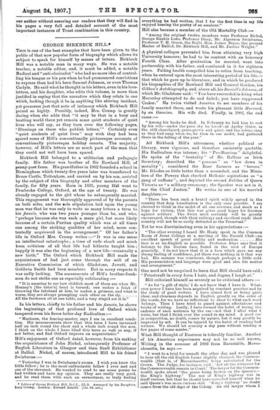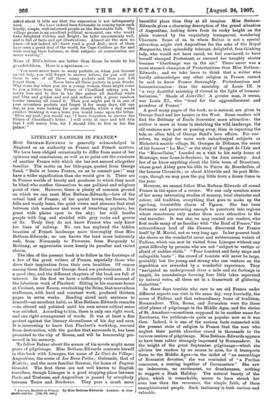GEORGE BIRKBECK HILL.*
THIS is one of the best examples that have been given to the public of that now popular form of biography which allows its subject to speak for himself by means of letters. Birkbeck
Hill was a notable man in many ways. He was a notable teacher, a notable editor, and, it must be added, a notable Radical and " anti-clericalist " who bad no more idea of control- ling his tongue or his pen when he had pronounced convictions to express than bad his hero Samuel Johnson, or even Thomas Carlyle. He said what he thought in his letters, even in his love- letters, and his daughter, who edits this volume, is more than justified in saying that the narrative which they relate is one which, lacking though it be in anything like stirring incident, yet possesses just that note of intimacy which Birkbeck Hill prized so highly. Possibly, indeed, Mrs. Crump is greatly daring when she adds that "it may be that in a busy and bustling world there yet remain some quiet students of quiet lives who will say, as they turn over the following pages, Blessings on those who publish letters.'" Certainly even "quiet students of quiet lives" may wish they had been spared some of Hill's conventionally picturesque accounts of conventionally picturesque holiday resorts. The majority, however, of Hill's letters are so much part of the man that they could not well have been spared.
Birkbeck Hill belonged to a utilitarian and pedagogic family. His father was brother of Sir Rowland Hill, of penny-post fame. His grandfather in 1802 founded a school in Birmingham which twenty-five years later was transferred to Bruce Castle, Tottenham, and carried on by his son, assisted by the subject of this biography and other members of the family, for fifty years. Born in 1835, young Hill went to Pembroke College, Oxford, at the age of twenty. He was already engaged to the girl whom he subsequently married. This engagement wag thoroughly approved of by the parents on both sides, and the sole stipulation laid upon the young man was that he was only to write so many letters a term to his fiancee, who was two years younger than he, and who, "perhaps because she was such a mere girl, but more likely because of a certain Puritan quality which was at all times one among the striking qualities of her mind, more con- tentedly acquiesced in the arrangement." Of her father's life in Oxford Mrs. Crump writes :—" It was in one sense an intellectual catastrophe; a time of rude shock and much keen criticism of all that life had hitherto taught him ; happily it was also the beginning of a new life—eventually a new birth." The Oxford which Birkbeck Hill made the acquaintance of had just come through the mill of an Executive Commission of which Gladstone, Jowett, and Goldwin Smith had been members. But in many respects it
was sadly lacking. The amusements of Hill's brother-fresh- men do not strike one as especially exhilarating :—
" It is amusing to see how childish most of them are when Mr
Henney's [the tutor's] head is turned; one makes a feint of throwing the inkstand at him, br makes a grimace, and what is
worse, they are always prompting each other on the sly All the freshmen sit at one table, and a very stupid set it is."
In his letters, chiefly to his father and his fiancee, he shows the beginnings of that profound love of Oxford which tempered even his fierce latter-day Radicalism :— " Maclaren, the fencing-master, says I am in excellent condi- tion. His measurements show that this term I have increased half an inch round the chest and a whole inch round the arm. I think on the whole I have liked this term as well as any, if not better, and find Oxford improve on acquaintance."
Hill's enjoyment of Oxford dated, however, from his making the acquaintance of John Nichol, subsequently Professor of English Literature in Glasgow and then Snell Exhibitioner at Balliol. Nichol, of course, introduced Hill to his friend Swinburne :—
"Yesterday I was in Swinburne's rooms. I wish you knew the little fellow ; he is the most enthusiastic fellow I ever met and one of the cleverest. He wanted to read to me some poems he had written and have my opinion. They are really very good, and he read them with such an earnestness, so truly feeling * Letters of George Birkbeck $ill, D.C.L., LL.D. Arranged by his Daughter, Lucy Crump. Loudon : Edward Arnold. [1.2a. dd. uet.j everything he had written, that I for the first time in my life enjoyed hearing the poetry of an amateur."
Hill also became a member of the Old Mortality Club
"Among the original twelve members were Professor Nichol, George Rankin Luke, Professor Dicey, Mr. Algernon Swinburne, Professor T. H. Green, the Right Hon. James Bryce, the present Master of Balliol, Dr. Birkbeck Hill, and Mr. Justice Wright."
A physical collapse prevented him from attaining very high University honours; he had to be content with an honorary Fourth Class. After graduation he married, went into partnership with his father, and continued in it for eighteen years. Failing health compelled him to retire from teaching, when be entered upon the most interesting period of his life,— that which he gave up to literature, and in which he produced his biographies of Sir Rowland Hill and General Gordon, his Gibbon's Autobiography, and, above all, his Boswell's Johnson, of which Mr. Gladstone said : "You have succeeded in doing what Macaulay attempted to do and failed ; you have suppressed Croker." He twice visited America to see members of his family married there, and wrote his pleasant little Harvard, by an Oxonian. His wife died. Finally, in 1902, the end came :— "Among his books he died. In February we laid. him to rest by his wife—under the pure sky he loved—at Apsley Guise, iu the still churchyard, grass-grown and quiet, and the robins sang as they had sung when we, he then in our midst, had gathered there in the falling of the year."
All Birkbeck Hill's utterances, whether political or literary, were vigorous, and therefore eminently quotable. His Radicalism was intense ; his " Pro-Boerism " delightful. He spoke of the " brutality " of Mr. Balfour as • Irish Secretary ; described the " parsons" as "low down 'in morality " ; considered the Boer farmers as " heroeg," Mr. Rhodes as little better than a scoundrel, and the Minis- ters of the Powers that checked Hellenic aspirations as " a gang of ruffians "; and depicted the second Jubilee of Queen Victoria as "a military ceremony ; the Speaker was not in it, nor the Chief Justice." He writes to one of his married daughters :- "There has been such a brutal spirit widely spread in the country that deep humiliation is the only cure possible. I am cheered to think in the midst of all our reverses, and much as I hope for victory, that this war gives good hopes for freemen against soldiers. The Swiss most certainly will be greatly encouraged, though with their railways and excellent roads their country will not be so easily defended as the Transvaal."
Yet he was discriminating even in his appreciations:— " The other evening I heard Mr. Healy speak in the Common Room of Jesus College at a meeting of the Russell Club—an
excellent speech of great ability and moderation. . . . His face is as un-English as possible. Professor Elva says that it belongs to the Iberian race, found in the west of Europe generally. I do not know that it is a face which gave me any strong feeling of confidence, yet there was nothing in it that was bad. His manner was courteous, though perhaps a little cold. His pronunciation and language were good and also his matter and arrangement."
One need not be surprised to learn that Hill should have said : "Priestcraft in every form I bate, and dogma I laugh at." Hill criticised himself as severely as he criticised others :- " As for 'a gift of style,' I do not know that I have it. What- ever power I have has been acquired by constant practice and by the study of 'good writers. I have aimed first at being quite clear, and clearness depends in English greatly on the order of the words, for we have no inflections to show to what each word belongs. Then I have tried to guard against affectations and tricks of writing. Lastly, I have formed the habit of trying the cadence of each sentence by the ear—not that I alter what I write, but that I think over the sound in my mind. A good car in composition, no doubt, comes by nature, but it may greatly be improved by art. It can be injured by the habit of reading bad writers. We should let scarcely a day pass without reading a few pages of some master."
What Hill thought of Emerson is tolerably familiar. Another of his American experiences may not be so well known, Writing in the summer of 1893 from Barnstable, Massa- chusetts, he says :—
" I went to a trial for assault the other clay, and was pleased to hear all the old English forms slightly changed, the Common- wealth [that is, of Massachusetts] being substituted for the Crown. The Judge, for instance, said : Let all the witnesses for the Commonwealth remain in Court.' The lawyer for the Common- wealth spoke about 'the peace being broken on the Queen's— the King's highway.' The use of King's highway was in itself curious, but that he should have corrected himself when he said Queen's was more curious still. ' King's highway' no doubt comes from the old days of the Colony. An old lawyer whom I asked about it tells me that the expression is not infrequently
used We have indeed been fortunate in coming upon such kindly, simple, well-informed people as the Barnstable folk. The village grocer is an excellent political economist, one who would have delighted Cobden. and Bright; he talks uncommonly well, and is full of facts and apt illustrations. Almost all the men we know—if not indeed all—have read a good deal ; most of them have seen a great deal of the world, for Cape Codders go far and wide seeking their fortunes, so that subjects of conversation are never wanting."
None of Hill's letters are better than those he wrote to his grandchildren. Here is a specimen :-
" You must never have so many pockets, or, when you become an old lady, you will forget to answer letters, for you will put them in one of all these many pockets and then you will
forget them Never have all these pockets in your frocks. Why some day when you are a young woman, there might come to you a letter from the Prince of Cloudland asking you to marry him and to live in his fine palace all dazzling white and blue and golden and red and saffron with a great rainbow border running all round it. Then you might put it in one of your seventeen pockets and forget it for many days, till one day, as you were looking for your thimble, which a dog would swallow thinking it was a bone, you would come upon the letter. Bless my soul,' you would say, 'I have forgotten to answer the Prince of Cloudland's letter. I will write at once and tell him
that I will marry him, for I should like to live in his fine palace's



































 Previous page
Previous page